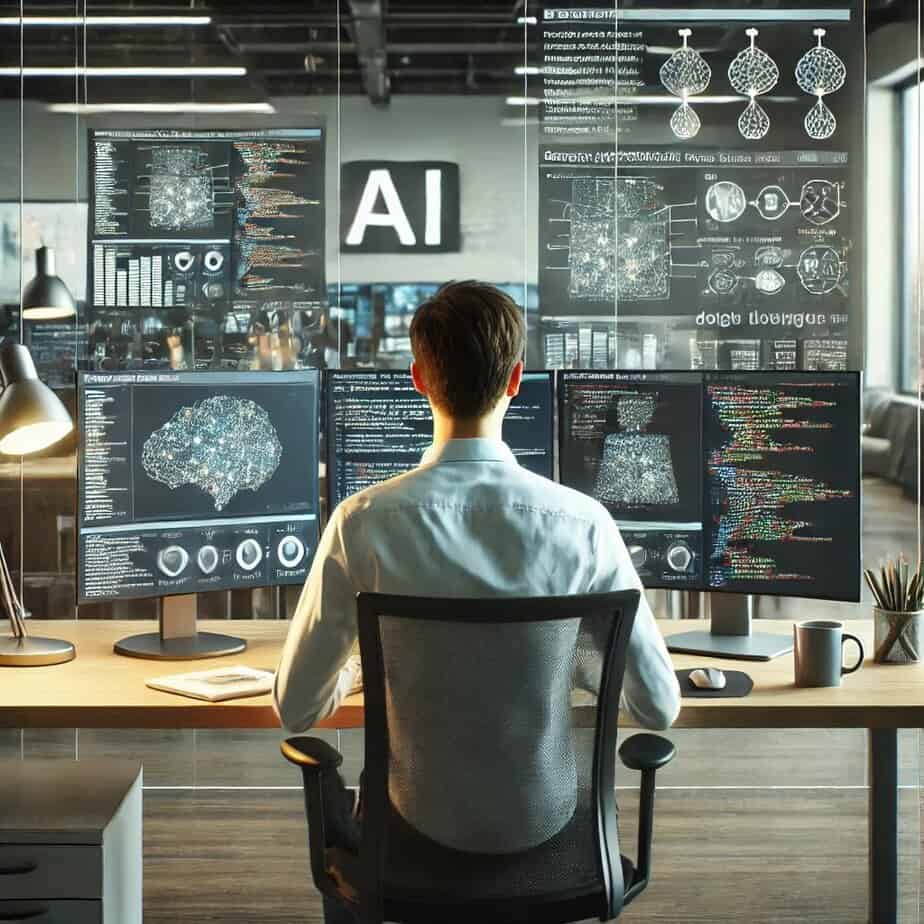Artificial Intelligence (AI) is a powerful tool that Christians can approach with both cautious wisdom and hopeful creativity. Used rightly, AI can assist us in education, communication, and productivity—but misused, it can distort truth, undermine human dignity, and even challenge biblical values. This post explores how Christians can navigate AI’s promises and pitfalls with biblical discernment.
From Turing to ChatGPT: A Brief History of AI
Artificial Intelligence may seem like a 21st-century marvel, but its roots go back nearly a century. In the 1940s, British mathematician Alan Turing laid the foundation for AI with his groundbreaking ideas about machines that could “think.” His famous question—Can machines think?—sparked decades of scientific and philosophical exploration.
Fast forward to the 1950s, when the term “Artificial Intelligence” was officially coined at a Dartmouth conference. For decades, AI existed mostly in research labs and science fiction novels, with computers learning to play chess or solve basic problems.
Then came the internet age. With the rise of big data, faster processors, and complex algorithms, AI began to make real-world impacts—in search engines, recommendation systems, and voice assistants like Siri and Alexa. But the most recent leap has been generative AI—tools like ChatGPT that can write, converse, code, and even mimic creativity.
We’ve gone from theory to daily reality. AI is now shaping how we learn, work, shop, and even interact with one another.
What Is Artificial Intelligence, Really?
At its core, Artificial Intelligence is a branch of computer science focused on building systems that can perform tasks that normally require human intelligence. These tasks include recognizing speech, translating languages, solving problems, and generating content.
But here’s the key: AI doesn’t “think” like a human. It doesn’t have consciousness, emotions, or a soul. Instead, it processes vast amounts of data, finds patterns, and makes predictions based on those patterns. It’s fast, efficient, and in some cases, eerily accurate—but it’s still just a tool.
Think of it like a power tool in the hands of a craftsman. It can help you build something beautiful—or, in the wrong hands, do serious harm.
Why This Matters for Believers Today
So why should Christians pay attention to AI?
Because it’s not just changing how we work—it’s shaping how we think, communicate, and make decisions. AI can influence everything from the news we see to the values we absorb. It can support ministry efforts or spread harmful ideologies. And like every powerful technology, it raises deep ethical and spiritual questions.
As followers of Christ, we’re called to be wise stewards of the tools we use (Colossians 3:17). That includes AI. Rather than avoiding it out of fear or embracing it uncritically, we’re invited to navigate this new frontier with both truth and grace—grounded in Scripture, guided by the Spirit, and shaped by the example of Jesus.
1. Understanding AI: What It Is and What It Isn’t
Artificial Intelligence is a term that can stir up excitement or anxiety, depending on who you ask. For some, it’s the promise of better healthcare and smarter technology. For others, it sounds like something out of a dystopian movie—machines taking over the world. So let’s pause and bring some clarity to what AI actually is—and what it isn’t.
What Is AI? (And a Few Buzzwords Demystified)
At its simplest, Artificial Intelligence refers to a computer system’s ability to perform tasks that typically require human intelligence. This includes things like recognizing faces in photos, understanding spoken language, writing essays, playing chess, or even diagnosing diseases.
A few terms you’ll often hear:
- Machine Learning (ML): This is when computers “learn” from large amounts of data. For example, by analyzing thousands of cat photos, an AI can eventually recognize what a cat looks like—even if it’s wearing a tiny cowboy hat.
- Neural Networks: Modeled after the human brain (kind of), these are systems that help AI process complex patterns. They’re especially good at things like language translation, image recognition, and predictive text.
- Generative AI: This is the kind of AI that creates things—like art, music, or even blog posts (yes, like this one). ChatGPT and similar tools use this technology to generate content based on patterns they’ve learned from mountains of data.
In all these cases, AI isn’t thinking. It’s not alive. It’s not conscious. It’s sophisticated math and code running really fast—nothing more, nothing less.
Clearing Up the Fears
Let’s be clear: AI is not sentient. It doesn’t have feelings, desires, or opinions. It doesn’t wake up one morning and decide to take over the world.
What it is, however, is powerful. It can simulate conversations, generate realistic images, and automate complex decisions. That means it can be used to help us—or to manipulate, deceive, or exploit. It’s not a villain, but it’s also not morally neutral. Like any tool, its impact depends on the hands and hearts of those who wield it.
AI in Context: The Printing Press, the Internet… and Now This
AI isn’t the first technology to shake things up.
When the printing press was invented in the 15th century, it revolutionized access to knowledge—and the Bible. Many feared it would cause chaos (and in some ways, it did). But it also helped fuel the Reformation and spread the gospel like never before.
Fast forward to the internet, which gave us instant access to information—and, let’s be honest, endless distractions. It connected people across the globe, but also introduced new challenges to truth, privacy, and community.
AI is the next leap. And just like those previous shifts, it presents both opportunities and temptations. The question isn’t whether it’s good or bad—it’s how we use it.
2. The Potential of AI for Good
As with most technological advances, the usefulness of AI depends on how it’s used. When guided by wisdom and integrity, AI can genuinely improve lives, solve problems, and even support Kingdom work. The goal isn’t to fear AI, but to steward it well—to see it as a gift that, like all gifts, should be used to glorify God and serve others.
In Education: Enhancing, Not Replacing, Student Creativity
AI can be a powerful tool in the classroom—not as a substitute for learning, but as a supplement to it.
Imagine a student with dyslexia using an AI-powered reading assistant that helps them comprehend texts more easily. Or a high schooler using AI to brainstorm ideas for an essay, getting over that first hurdle of writer’s block while still doing the hard work of crafting and refining their thoughts.
When used wisely, AI can:
- Offer personalized tutoring
- Translate content for ESL learners
- Encourage curiosity and deeper research
The key is to equip students to think critically and creatively, using AI as a launchpad—not a crutch. As believers, we want to nurture the God-given imagination and intellect of every student, not outsource it to a machine.
In Medicine, Communication, and Accessibility
AI’s impact in healthcare is already life-changing. It can analyze medical images to detect diseases early, streamline diagnostics, and even assist in robotic surgeries. For rural areas or underserved populations, AI can help bridge gaps in care.

In communication, AI helps break language barriers through real-time translation tools. For individuals with disabilities, AI can enable greater independence—like voice-activated technology for the visually impaired or predictive text for those with mobility challenges.
These are not small things. They reflect God’s heart for compassion, healing, and inclusion—reminders that technology, when aligned with His purposes, can truly bless humanity.
In Churches and Ministries: Reaching the Lost in New Ways
Believe it or not, some churches are already using AI in their ministries. From chatbots that answer common faith questions on websites, to sermon transcription tools, to automated follow-up systems for new visitors—AI can free up time and energy for deeper relational ministry.
Mission organizations are experimenting with AI to:
- Translate Scripture into unreached languages faster
- Analyze social media trends to identify regions open to the gospel
- Create personalized discipleship plans based on user input
While no tool can replace the work of the Holy Spirit or the need for human connection, these innovations can enhance our efforts to share Christ’s love and truth in a rapidly changing world.

Encouraging Responsible Innovation with a Christian Worldview
Technology by itself is not moral or immoral—it’s directional. That’s why Christians should be part of shaping how AI is developed and deployed.
We need voices who:
- Advocate for ethical use of data and privacy
- Ensure AI respects human dignity, not just profit
- Challenge biases baked into algorithms
- Encourage transparency and accountability
This is an opportunity to lead—not just react. To build, not just critique. Proverbs 11:10 says, “When the righteous prosper, the city rejoices.” Let’s be those who pursue innovation that brings life, light, and justice to the world.
3. Where AI Can Go Wrong
For all its promise, Artificial Intelligence carries significant risks. Like fire or nuclear energy, AI is a powerful force—one that can be harnessed for good or used in ways that harm individuals, distort truth, or erode trust. As Christians, we must remain both hopeful and honest, acknowledging the real dangers of this technology in the wrong hands.
Misinformation, Manipulation, and Deepfakes
One of the most concerning uses of AI is its ability to generate false information that looks real. Deepfake videos can put words in someone’s mouth. AI-generated articles can mimic reputable sources while spreading lies. This blurring of reality is especially dangerous in a culture already wrestling with truth.

Isaiah 5:20 warns, “Woe to those who call evil good and good evil, who put darkness for light and light for darkness.” When technology is used to deceive, it isn’t neutral—it’s a tool of confusion.
As believers, we must be committed to truth—not just in doctrine, but in daily life. That includes learning to spot and resist AI-generated falsehoods and holding tech companies accountable for transparency and responsibility.
Replacing Human Connection and Judgment
AI can simulate conversation, write sermons, or offer mental health support—but it can’t replace the human heart. There’s no algorithm for empathy. No chatbot can truly weep with those who weep (Romans 12:15) or offer the wisdom of the Spirit.
In churches, there’s a temptation to automate everything—from visitor follow-up to prayer requests. Efficiency is great, but if we’re not careful, we risk creating a version of community that’s fast and frictionless—but ultimately hollow.
AI also raises concerns about outsourcing moral decisions to machines—whether in criminal justice, hiring, or healthcare. When discernment is reduced to data, justice and mercy often fall by the wayside.
Built-in Bias and the Dehumanizing Potential of AI
AI systems learn from the data they’re fed—and that data often reflects human bias. Studies have shown that facial recognition systems are less accurate for people of color, and hiring algorithms can favor certain demographics over others.
This reminds us that sin affects systems, not just individuals. We live in a fallen world, and our tools—no matter how advanced—carry the fingerprints of that fallenness.
There’s also the danger of dehumanization—treating people as data points, consumers, or productivity units rather than image-bearers of God. AI can scale decisions quickly, but it can also strip away the nuance, dignity, and personal attention that Christ modeled in His ministry.

A Biblical Perspective on Caution
Paul’s words in 1 Corinthians 10:23 are helpful here: “All things are lawful,” but not all things are helpful. “All things are lawful,” but not all things build up.
Just because we can use AI doesn’t mean we always should. And when we do, we must ask:
- Does this honor the image of God in others?
- Does it build up the body of Christ or weaken real relationships?
- Does it promote truth, justice, and compassion?
Discernment isn’t about rejecting technology outright—it’s about walking wisely in a world full of choices, trusting the Holy Spirit to guide us in love and truth.
4. Discernment in the Digital Age: What Christians Should Watch For
AI is not going away. In fact, it’s likely to become even more embedded in our daily lives—from our phones and smart devices to our churches and classrooms. So the real question becomes: How can Christians engage with AI without losing their grounding in truth, grace, and the wisdom of God?
Discernment is more important than ever—not the fearful kind that sees doom in every device, but the Spirit-led kind that “tests everything; hold[s] fast what is good” (1 Thessalonians 5:21).
Stay Informed—Without Becoming Fearful
It’s easy to feel overwhelmed by AI headlines—especially when they’re laced with warnings about job losses, surveillance, or the end of humanity as we know it. But as Christians, we’re not called to panic. We’re called to peace (Philippians 4:6–7) and to seek wisdom in a world that’s always changing.
Stay informed, yes—but don’t let fear be your guide. The Lord hasn’t given us a spirit of fear, but of “power and love and a sound mind” (2 Timothy 1:7). Read widely, ask good questions, and trust that God is still sovereign—even over algorithms.
Practical Wisdom: Using AI as a Tool, Not a Substitute
AI can help us grow in faith when used properly. For example:
- Bible study tools like Logos or AI-powered concordances can uncover Greek and Hebrew insights.
- Sermon planners or idea generators can help pastors brainstorm or organize thoughts.
- AI can help summarize long articles, translate devotionals, or even assist with writing prayers.
But here’s the caution: AI should never replace the work of the Spirit, personal prayer, or Christian community. It can offer insight, but it doesn’t transform hearts. Only God’s Word, applied by the Holy Spirit, does that.
Ask yourself:
- Am I using this tool to deepen my faith—or avoid doing the spiritual work myself?
- Is this helping me love God and others more—or making me more self-reliant and rushed?
Red Flags in AI-Generated Content
As AI becomes more persuasive and personal, here are some things to watch for:
- Loss of Truth – AI is trained on vast internet data, which includes everything from Scripture to spiritual nonsense. It can mix truth with error in ways that sound right but are doctrinally off. Always test it against God’s Word.
- Dehumanization – Beware of AI content that treats people like problems to solve instead of souls to love. Technology can flatten compassion into efficiency.
- Moral Compromise – Some AI tools generate content that normalizes sin or presents ungodly views as neutral or “progressive.” We must stay anchored in the unchanging truth of God’s Word—even when culture shifts.
The Role of Community and Pastoral Leadership
Discernment doesn’t happen in isolation. It grows best in community.
Pastors, elders, and small group leaders can help shepherd people through questions like:
- Should we be using AI in worship planning?
- How do we talk to our kids about AI at school?
- What boundaries should we set at home?
Churches have a unique opportunity to equip believers to think biblically in a digital age. Workshops, Q&A nights, or even sermon series on wisdom and technology can prepare the body of Christ to engage, not escape.
Proverbs 15:22 reminds us, “Without counsel plans fail, but with many advisers they succeed.” Let’s lean into godly counsel, especially as we navigate new and unfamiliar ground.
5. Shaping the Future: Advocating for Righteous Use of AI
As Christians, we are called not only to respond to the culture but to influence it—to be salt and light in every sphere, including technology. That means we don’t just react to AI advancements; we help shape how they’re used. We speak up for truth, justice, and human dignity in boardrooms, classrooms, and legislative halls.
We’re not just along for the ride—we’re called to help steer the vehicle.
Encouraging Ethical Leadership and Governance
AI isn’t just a church issue; it’s a public policy issue. Governments and tech companies are already wrestling with how to regulate AI in areas like facial recognition, surveillance, data privacy, and misinformation.
Christians can—and should—encourage lawmakers to:
- Protect human rights and dignity
- Ensure fairness and transparency in algorithms
- Prevent the exploitation of the vulnerable (e.g., deepfake abuse, automated hiring bias)
- Promote the use of AI for humanitarian and educational purposes
This isn’t about pushing a partisan agenda—it’s about pursuing righteousness and mercy at the societal level (Micah 6:8). When we advocate for laws that reflect God’s justice and love, we help build a future that honors Him.
Christian Voices in Tech: We Need More, Not Fewer
If the only voices shaping AI belong to those driven solely by profit, efficiency, or cultural trends, we’re in trouble.
We need Christian programmers, data scientists, ethicists, and engineers—people who see technology not as an idol, but as an opportunity to serve and steward wisely. Theologians and pastors also have a role: to engage the ethics of technology from a biblical worldview and help guide the Church’s response.
Imagine what it could look like if more Christians helped design AI systems that protect privacy, prioritize fairness, or promote spiritual well-being. We need those voices now more than ever.

Educating the Next Generation: Creators, Not Just Consumers
The next generation is growing up with AI all around them. Rather than shielding them in fear, we can equip them with wisdom and skill—teaching them not just to use AI, but to shape it.
- Teach children and teens how AI works and where it can mislead.
- Encourage creativity, ethics, and responsibility in tech-related education.
- Emphasize that human imagination, fueled by the Spirit of God, will always outshine machine-generated content.
Let’s help our kids become creators who reflect the image of the Creator—not passive consumers being shaped by a digital world.
Transformed, Not Conformed
Romans 12:2 offers a compass for every believer navigating the complexities of culture and technology:
“Do not be conformed to this world, but be transformed by the renewal of your mind, that by testing you may discern what is the will of God, what is good and acceptable and perfect.”
AI will continue to evolve—but so must our discernment. Rather than conforming to the pace and patterns of this world, we seek transformation through the mind of Christ. That’s how we engage AI—not as passive users, but as thoughtful, Spirit-led ambassadors of the Kingdom.
6. AI and the Image of God
At the heart of every discussion about AI—its power, its promise, and its pitfalls—is a deeper question: What does it mean to be human? As Christians, we believe that every person is created in the image of God (Genesis 1:27), endowed with inherent dignity, creativity, and purpose. And that truth should shape how we think about technology—especially one that tries to mimic the human mind.
AI Can Imitate, But It Cannot Create Life
Artificial Intelligence can write poems, generate art, and simulate empathy—but it does not possess a soul. It cannot experience love, grace, guilt, or redemption. It cannot worship. It cannot be known by God in the personal, relational way we were made for.
Humans are unique in all creation—not because we’re the most efficient, but because we are made to reflect God’s character. That includes our ability to reason, create, choose, and love. AI can replicate patterns, but not purpose. It can generate content, but not conscience.
That’s why, no matter how advanced AI becomes, it will never replace what makes us truly human: the breath of God in our lungs and the Spirit of God in our hearts.
Honoring Human Dignity in a Digital Age
When we remember the image of God in others, we treat people with respect—even in a world driven by data. We resist systems that reduce people to statistics. We protect the vulnerable, advocate for truth, and insist on ethical boundaries, not because it’s profitable, but because it’s right.
And we remember that our own value isn’t found in how productive we are or how “smart” we seem compared to the latest technology. Our worth is rooted in Christ, who gave His life for us—not to make us more efficient, but to make us new.
Hope for the Future—Rooted in Redemption
The AI age may feel overwhelming, but we’re not the first generation to face a technological revolution. And we won’t be the last. The good news is that Jesus Christ is the same yesterday, today, and forever (Hebrews 13:8). His gospel doesn’t need an update, and His truth doesn’t go out of style.
We don’t look to machines to save us. We look to the cross. And in a world filled with artificial everything, our call is to live authentic, Spirit-led lives that reflect the hope and holiness of Christ.
Conclusion: Living Faithfully in an AI-Driven World
Artificial Intelligence is no longer a distant idea—it’s here, woven into the fabric of daily life. As Christians, we’re called not to hide from it, nor to embrace it blindly, but to engage it with discernment, hope, and a Kingdom mindset.
We’ve seen how AI can be a powerful tool for good—enhancing education, advancing medicine, and even supporting ministry efforts. But we’ve also explored how it can distort truth, devalue people, and tempt us to trade relationship for efficiency. In all of this, the question is not just what AI can do, but what we, as followers of Christ, are called to do in response.
That calling hasn’t changed:
- To walk in truth, even when the digital world blurs the lines
- To uphold human dignity, even as machines grow more capable
- To teach the next generation not just how to use technology—but how to live wisely with it
- To reflect the image of our Creator in a world fascinated with artificial creation
Let’s not be conformed to the rhythms of this age but transformed by the renewing of our minds (Romans 12:2). Let’s use the tools of our time to build what lasts: faith, hope, and love.
And above all, let’s remember this: No matter how “smart” technology becomes, it will never replace the need for grace, truth, and the transforming power of the gospel.
How about you?
Have you seen AI used in ways that uplift or concern you? Are there ways your church, workplace, or family is engaging with these new tools?
Share your thoughts in the comments—we’d love to hear how you’re navigating the world of AI with faith and wisdom.





Leave a Reply